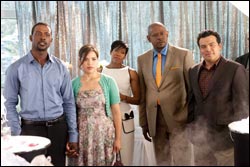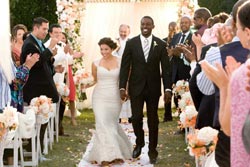Our Family Wedding is a story of two fathers getting married.
Well, not precisely. It is actually more conventional: a story of a young man and woman getting married. But their fathers — and, to a lesser extent, other family members—throw themselves into the center of affairs and complicate them.
Lucia (America Ferrera, star of the TV show Ugly Betty) and Marcus (Lance Gross) have been living together and were just secretly engaged. At the start of the film, they hop a train to Los Angeles and break the big news to their families at a joint dinner. Lucia is more than a little nervous, since her father has never even heard of Marcus until now. Plus, no one in her family knows that she’s been living with him or that she’s dropped out of law school so that she can go with him to Laos, where he will work with humanitarian group Doctors Without Borders. So when she and Marcus share the news, Lucia decides to cover up the fact that she’s been living with Marcus and isn’t finishing law school. Even so, the announcement sets off a firestorm, and the families don’t exactly hit it off.

Lucia’s family is Mexican American and Marcus’s is African American, and Our Family Wedding plays this up as a comedy of culture clashes. This set-up has been done before—think My Big Fat Greek Wedding—but this is more unusual in that both families are ethnic minorities. I was interested to see what might come of this.
Not a whole lot does, unfortunately. Racial verbal jabs abound, but they are predictable and not particularly funny. (Full disclosure: I’m white.) And we are never convinced that anyone really means what they say. Lucia’s father, Miguel (Carlos Mencia), and Marcus’s father, Bradford (Forest Whitaker), engage in most of the verbal sparring, but it all feels like a hollow routine. (Mencia, incidentally, is best known as a comedian.) Their mutual antagonism has more to do with an extraordinarily coincidental run-in they have hours before the dinner than with cultural assumptions or innate prejudices.
If you have seen Gran Torino, you’ll remember Clint Eastwood’s virulently racist character. To listen to the elaborate, non-stop slurs he fires off is uncomfortable. But strangely enough, it’s also funny because, as extreme and offensive as those slurs are, you believe that they are coming from a real, eccentric, and yes, racist old man — not a standup comic. Moreover, when Eastwood’s character does begin to shed a little of his racist baggage, it really means something.
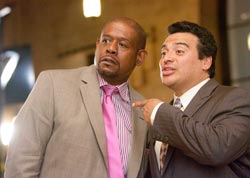
Likewise, this shortcoming of Our Family Wedding detracts from more than the comedy. In an interview with Collider.com, lead actress Ferrera says that the film demonstrates how, between cultures, “there are all these differences, and yet the core is the same… . We’re all so much more alike than we think.” Well, that kind of revelation would have been more meaningful in the film if there had been more legitimate “differences” in the first place.
But this isn’t just a film about (or not about) race. It’s also about the pitfalls of planning a wedding, especially when both families have strong ideas about how the ceremony must go. As the couple learns: “Our marriage, their wedding.”
In one amusing scene the families sit down and try to plan seating arrangements for the reception. The difficulty of the process is underscored by the complicated set of tiny markers and icons they use to map out different combinations of people and tables. As already mentioned, though, the fathers are two of the biggest obstacles to the union. Not only does their dislike for each other create havoc, they also harbor deep reservations about the marriage. Bradford is divorced; this makes him skeptical that Marcus can really know that Lucia is the one for him. Meanwhile, Miguel gives Marcus heat for the fact that he didn’t ask him for his daughter’s hand in marriage, and for his mistaken notion (caused by Lucia’s cover-up story about her law school plans) that Lucia will be forced to be the breadwinner.
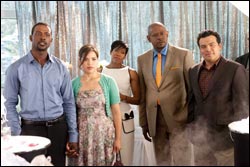
The tensions almost undo Marcus and Lucia’s relationship. At the same time, each father is hitting rock bottom in his own love life, and Miguel’s story offers one of the film’s stronger themes. His problem is that he takes his wife for granted. He calls the cars he fixes up “sexy,” but his wife, when she asks him how she looks, is “fine.” Eventually she can bear it no longer and confronts him. Miguel must learn that, as long as she is his wife, he cannot stop pursuing and affirming her.
Another worthwhile theme in Our Family Wedding is the centrality of repentance in a relationship. At a point when things aren’t looking good for the marriage-to-be, Bradford tells Marcus one of the “signs” to knowing if a woman really loves you: whether she laughs at your jokes.
“Lucia laughs at my jokes,” says Marcus.
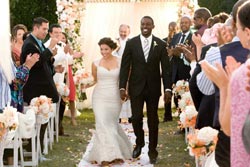
But moments later, Marcus gets a better sign. Lucia humbles herself enough to show up in his backyard and repent of her failure to be honest with her father and to protect Marcus from undeserved attacks.
And speaking of bright spots in the film, Ferrera is excellent in the role of Lucia. She is always convincing, whether she is anxious, embarrassed, or delighted, and she makes her character eminently sympathetic.
But Our Family Wedding still hits a lot of wrong notes. It’s a comedy that only coaxes out a few chuckles, and at times is simply tasteless. (The low point is a gag involving a goat and Viagra — and I don’t think it is a mythological reference.) No more than two or three of its characters invite you to care about them. And, for a film that purports to be about culture clashes, it neglects to give any substantive insights into them, except maybe that black people can in fact wear sombreros and old Mexican women can grind to hip-hop music.
Talk About It
Discussion starters- To what extent is a wedding for the bride and groom? To what extent is it an event for each of the families?
- “We’re all so much more alike than we think,” says Ferrera. Do you agree? How does Scripture speak to this?
- Why do many married men fail to affirm and love their wives as they ought?
- If you are deciding whether you should marry someone, are there specific signs, good or bad, you should look for?
The Family Corner
For parents to considerThere is some mild language and one f-word. There are a few scenes that are suggestive of sex having taken place, and a few conversations about sex, directly or indirectly. But there is no nudity, and nothing more graphic than some kissing. In one stupid scene, we see from behind a sexually aroused goat humping a person’s leg.
Photos © Fox Searchlight.
Copyright © 2010 Christianity Today. Click for reprint information.



